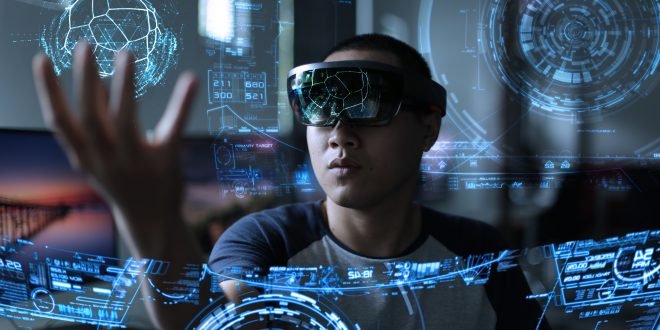From Sci-Fi to Reality: The Evolution of AI
Discover how artificial intelligence (AI) has transitioned from the realms of science fiction to the heart of our daily lives. Uncover the journey from early dreams of human-like cognition to the practical applications of narrow AI and the transformative power of machine learning and deep learning. Explore AI's impact on industries, its ethical considerations, and the exciting prospects that lie ahead as AI continues to evolve. Join us as we delve into the remarkable transformation of AI from sci-fi fantasies to tangible realities, shaping a future where technology and humanity intertwine.

**From Sci-Fi to Reality: The Evolution of AI**
In the realm of science fiction, artificial intelligence (AI) has often been portrayed as both a marvel and a menace. From intelligent robots with human-like emotions to dystopian visions of AI-driven domination, the portrayal of AI in books, movies, and television shows has captured the imagination of generations. However, as we stand on the precipice of a technologically transformative era, it's worth exploring how AI has transitioned from the pages of sci-fi novels to the fabric of our reality.
**The Genesis of AI: Seeds of Inspiration**
Long before AI became a buzzword, the seeds of its inspiration were sown in the minds of visionary thinkers. The term "artificial intelligence" was first coined by John McCarthy in 1956 during the Dartmouth Workshop. This event marked the birth of AI as an academic discipline and brought together brilliant minds to explore the possibilities of creating machines that could simulate human intelligence.
**Early Dreams and Limitations**
In the early stages, AI research was driven by lofty dreams of creating machines capable of human-level thinking and reasoning. The optimism was fueled by breakthroughs such as the Logic Theorist, a program developed by Allen Newell and Herbert A. Simon that could prove mathematical theorems. However, the initial euphoria was soon tempered by the challenges of AI. The "AI winter," a period of stagnation in AI research, cast doubts on the feasibility of achieving human-like intelligence in machines.
**Narrow AI: The Stepping Stone**
The evolution of AI took a significant turn with the emergence of narrow AI, also known as weak AI. Instead of trying to replicate human cognition across the board, researchers began focusing on developing AI systems that could excel at specific tasks. This approach led to practical applications such as speech recognition, optical character recognition, and game-playing programs like IBM's Deep Blue, which defeated chess grandmaster Garry Kasparov in 1997.
**Machine Learning: Unleashing AI's Potential**
At the heart of AI's evolution lies machine learning—a field that has redefined the possibilities of AI. Machine learning algorithms enable computers to learn from data, recognizing patterns and making predictions without being explicitly programmed. This shift in approach has paved the way for breakthroughs in natural language processing, image recognition, and recommendation systems.
**Deep Learning: Powering the AI Renaissance**
Within the realm of machine learning, deep learning has emerged as a transformative force. Inspired by the structure and function of the human brain's neural networks, deep learning models have achieved remarkable feats. Image recognition, for instance, saw a watershed moment with the advent of Convolutional Neural Networks (CNNs), enabling AI to surpass human-level accuracy in tasks like image classification.
**AI in Everyday Life**
Today, AI is an integral part of our daily lives, often operating behind the scenes to enhance convenience and efficiency. Virtual assistants like Siri, Alexa, and Google Assistant leverage natural language processing to understand and respond to human commands. AI-powered recommendation systems on streaming platforms and online marketplaces use data-driven insights to suggest content and products tailored to individual preferences.
**Beyond Automation: AI's Societal Impact**
AI's evolution has extended far beyond mere automation. It has reshaped industries, from healthcare and finance to manufacturing and transportation. In healthcare, AI aids in diagnosing diseases, predicting patient outcomes, and accelerating drug discovery. In finance, algorithmic trading powered by AI algorithms responds to market dynamics in real time. Self-driving cars, an emblem of AI's potential, are inching closer to becoming a reality, promising safer roads and improved traffic management.
**Ethical Considerations and Future Prospects**
As AI's capabilities expand, ethical considerations come to the forefront. The potential for biased decision-making in AI algorithms, the impact on jobs due to automation, and concerns about AI surpassing human intelligence (the so-called "singularity") raise questions about the responsible development and deployment of AI technologies.
Looking ahead, the evolution of AI remains an exciting trajectory. Continued advancements in deep learning, reinforcement learning, and AI ethics are on the horizon. The convergence of AI with other cutting-edge technologies, such as quantum computing, could unlock new realms of possibility.
**In Conclusion**
From the whimsical visions of science fiction to the tangible impact on industries and societies, AI's journey from sci-fi to reality is nothing short of remarkable. As we navigate the uncharted waters of AI's evolution, it's crucial to steer its development towards positive outcomes that amplify human potential and address the challenges that come with it. The next chapter in AI's story is waiting to be written—one where humanity and technology coexist harmoniously, reshaping the world in ways we're only beginning to imagine.
What's Your Reaction?




















